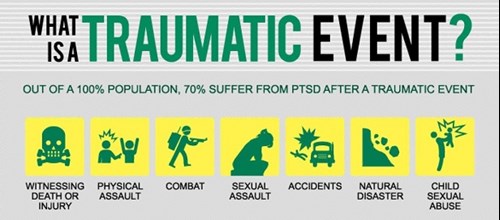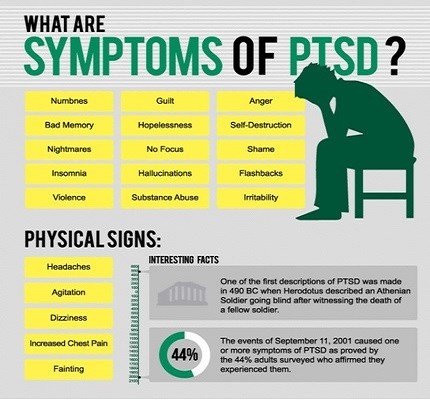PTSD and How It Affects Males
Date: Monday 31 Jul 2017
We don’t talk about Post Traumatic Stress much, especially not from the Everyman’s point of view. We hear about it in relation to war veterans, but what about the man in the street? It is an anxiety disorder that can devastate an individual and those close to them and can happen to anyone.

Unfortunately, every day we see and hear in the media, stories that report on life ending events, caused by crime or tragic accidents. There seems to be little written about how the survivors and witnesses cope with the aftermath.
In their on line leaflet about PTSD, the Royal College of Psychiatrists write about why experiencing trauma is so disturbing: “[Traumatic events] undermine our sense that life is fair, that it is reasonably safe and that we are secure. A traumatic experience makes it very clear that we can die at any time. The symptoms of PTSD are part of a normal reaction to narrowly-avoided death”.
The symptoms of PTSD can develop a few weeks after a traumatic experience. Some people manage to overcome the symptoms of PTSD on their own soon after but some trauma victims are less fortunate and sadly can’t overcome their symptoms on their own and go on to develop PTSD.
The NHS believes the 30% of people who experience a traumatic event in their lifetime develop PTSD. Social distortion follows in its wake. Flash backs and vivid nightmares attack the fabric of a sufferer’s balance of everyday life. Two of the major symptoms of PTSD are depression and anxiety.
What follows is Neil’s story of how he is working to overcome the after effects of a major accident, the onset of depression and how he stood up to PTSD.

When I first met up with Neil he held an edge behind our polite introductions. He was an HGV/Specialist load driver. First impressions saw a man with broad shoulders, a subtle swagger, and tattoo sleeved arms. His firm handshake didn’t indicate any perceivable emotional trauma.
But then again, first impressions don’t take into consideration a man’s life experience and his battle with an invisible illness that not only challenges his identity but also questions his masculinity.
Neil’s accident happened when he was inspecting his trailer and tying on his load. The galvanised steel was loaded by a third party and was loaded incorrectly. It collapsed under him. He fell and smashed his wrist and leg, leaving broken bones exposed to the elements. His young son was strapped into his child seat in the cab – it was a treat trip away in Dad’s lorry. Neil didn’t want to call for help in case he caused his son distress. It seemed to be a catch 22 but soon help was standing over him. Luckily Neil’s misfortune had been witnessed from a distance.
Soon after the accident, Neil started to experience the symptoms of PTSD. Vivid nightmares and flashbacks weakened his identity and he developed stronger episodes of depression and anxiety.
‘After the accident, I was not myself. I was a different person and angry with the world. I was manically depressed. I didn’t want to talk about the PTS for a long time’.
Realising his mental health was being effected, Neil found the confidence to find help and visit his GP. I asked about the help Neil was offered after the accident:
‘[My GP] didn’t offer me counselling, I had to ask for it. I got just six counselling sessions on the NHS. To be fair, I would have been better off wiping my arse with the paper it was written on’. Neil was frustrated and angry.
He had been left out on a weak, emotional limb, feeling deserted and let down by the limits of the NHS help available to him at the time.
It was during the travelling to and fro to his NHS counselling sessions that his friend suggested that he might have PTSD brought on as a result of his accident. A specialist solicitor took on Neil’s case.
It was at the start of his legal journey that Neil got his PTSD diagnosis. After being concerned with his welfare, his solicitor sent him to see a private psychiatrist.
Initially, Neil was worried about what his friends would think of him if he told them that he had a diagnosed mental health disorder. These worries were unfounded and he discovered that his true friends were there to support him. Some mates didn’t get it at first, talking about their emotions. They couldn’t see through the stigma, their tough upbringing and ‘old school’ points of view on life and ‘what men do’.
In speaking out, Neil seems to have enabled his mates to open up to each other in the process. A little uneasily but it’s a start, a positive outcome out of a negative experience.
Read More HERE

